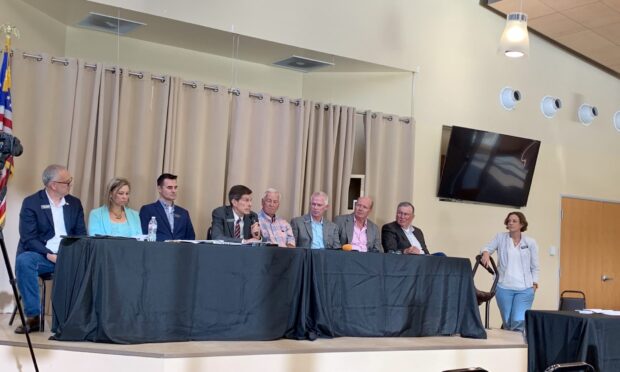This year, Gov. Brad Little and legislators agreed to put off a grocery tax repeal until 2020.
Now, 2020 isn’t looking like a done deal.

“I don’t see how we can make it work,” Rep. John Vander Woude, R-Nampa, said Tuesday evening.
Vander Woude’s comments came at the end of a two-hour House Republican town hall meeting in Meridian, and a day after Little sounded an alarm about the state’s cashflow.
In a memo Monday, Little urged state agencies to limit their 2020-21 budget requests and identify two or three items that could be cut, Keith Ridler of the Associated Press reported. Last week, Little’s Division of Financial Management said 2019-20 state revenues could come in $96 million below projections. This would slash the budget reserve lawmakers set aside this spring, leaving a cushion of about $51 million.
“That should be cause for concern for all of us,” said House Speaker Scott Bedke, R-Oakley.
Bedke didn’t mention spending for education — or the big-ticket ideas on teacher pay raises or full-day kindergarten that could emerge from Little’s K-12 task force. (As far as that goes, education hardly came up at all in a meeting dominated by questions about taxes, transportation and growth.) But while Bedke didn’t address school budgets per se, he also didn’t sound like he has much of an appetite for new initiatives.
“I think we should start chewing what we’ve already bitten off as a state,” he said.
When Little asked lawmakers to delay a grocery tax repeal, he also recommended setting aside budget reserves to cover the cost — roughly $80 million.
With reserves dwindling, both Vander Woude and Bedke tamped down expectations about a repeal. They come at the issue from different perspectives. Vander Woude has long supported the repeal. Bedke voted against a repeal bill in 2017, later vetoed by then-Gov. Butch Otter.
On Tuesday, Bedke said the repeal isn’t as simple as it sounds. The state already offsets much of the sales tax on food, through $190 million in income tax credits. And tourists from out of state pay a share of Idaho’s grocery taxes, he said.
More and more, the 2020 legislative session is shaping up as a battle over dollars that are in unexpectedly scarce supply. Those pressures came up Tuesday, as other House members spelled out their priorities for next year. House Majority Leader Mike Moyle, R-Star, pitched for income tax relief. House Transportation Committee Chairman Joe Palmer, R-Meridian, pledged to push for money for roads without raising taxes.
Left unmentioned, at least for one night, was the question of education spending.
